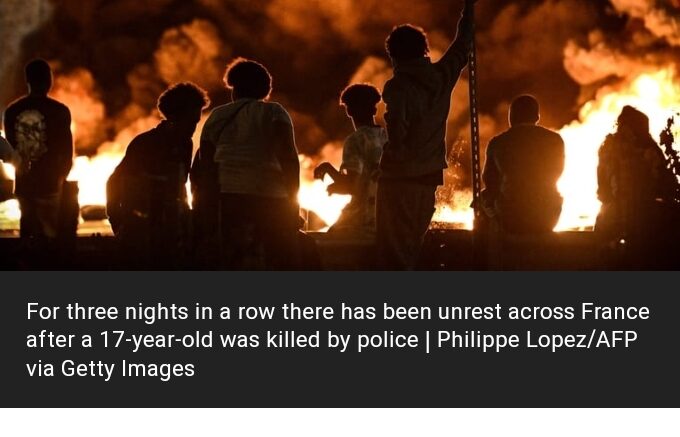France braces for more violence with armored vehicles, more cops deployed
Far-right politicians called for a state of emergency to be imposed as the government seeks to tackle the unrest.
PARIS — The French government is scrambling to find a way to curb the violence that has rocked the country for three nights in a row after a teenager was shot dead by police during a traffic stop.
After French President Emmanuel Macron chaired a government crisis meeting Friday, Prime Minister Elisabeth Borne said armored vehicles and extra police forces would be deployed in an attempt to curtail riots, as authorities geared up for another night of violent outbursts.
Speaking on French TV Friday evening, Interior Minister Gérald Darmanin announced that 45,000 police officers would be mobilized — 5,000 more than Thursday. He added that 917 people were arrested on Friday.
Several suburban cities around Paris have brought in night-time curfews through to Monday. Many school events that were scheduled to take place over the weekend, a week away from the summer break, have been cancelled. Buses and trams will stop circulating after 9 p.m. throughout France.
There has been unrest across France after a 17-year-old was killed by police in a Paris suburb, with protesters targeting public buildings, transport systems, and shops with projectiles and Molotov cocktails. Riots have erupted in large cities such as Paris, Lyon, Lille, Marseille and Bordeaux, as well as smaller towns such as Roubaix.
For local authorities, law enforcement, and young people in the impoverished banlieues, the shadow of the 2005 riots that rocked French suburbs for weeks looms large.
French authorities on Thursday mobilized 40,000 security forces throughout the country, including 5,000 in Paris. The interior ministry announced that 875 people had been arrested and 249 members of law enforcement injured on Thursday night as protesters burned cars, trash cans, schools, police stations and looted stores.
The United Nations’ human rights office weighed in saying “issues of racism and discrimination in law enforcement” needed to be addressed in the country.
“We are concerned by the killing of a 17-year-old of North African descent by police in France on Tuesday,” UN human rights office spokeswoman Ravina Shamdasani said at a media briefing in Geneva. “This is a moment for the country to seriously address the deep issues of racism and discrimination in law enforcement.”
Belkhir Belhaddad, a member of Parliament from Macron’s party said discrimination remains a salient issue in France. “Discrimination based on origin is one of today’s key issues. You have young people in many territories who have a desire for France, and the image that is sent back to them by part of society is that you’re not real French.”
‘No taboo’
The government is walking a tightrope between taking a firm stance on violence and calling for appeasement. Back in 2005, then-Interior Minister Nicolas Sarkozy was widely seen as having added fuel to fire with harsh comments about the protesters.
The government will seek to “restore authority,” an official close to Macron told POLITICO, speaking on condition of anonymity to discuss sensitive issues. An official from the Elysée Palace told Agence France-Presse that nothing would be “taboo” in the discussions on how to handle the situation.
A third official told POLITICO that the Elysée also wants to work on three priorities to emerge from the crisis: “Employment, schools and dialogue.”
Opposition parties were quick to weigh in on the issue.
The head of France’s far-right National Rally Marine Le Pen attacked left-wing parties and unions, blaming them for fueling violence, while accusing Macron’s government of being too soft on migration and criminal repression.
“These appalling events bring our leaders back to the reality that they lost sight of because of the intoxication of solitary power and crazy ideological construction, particularly on immigration, and judicial laxism,” she said.
Other far-right and conservative political figures, including former presidential candidate Eric Zemmour, called for a state of emergency. Prime Minister Elisabeth Borne rejected the idea of a state of emergency on Thursday but said midday Friday all options were on the table.
“We’ll see what the president decides after tonight,” Darmanin said Friday evening.
A state of emergency provides authorities with more power including setting curfews and banning demonstrations — such powers were used after the 2005 riots and the 2015 Paris terror attacks.
The left has a tradition of denouncing police violence against young people from the banlieues, but is divided on how to address violent protests.
Far-left leader and former presidential candidate Jean-Luc Mélenchon and some of his lieutenants refused to call for appeasement, instead “calling for justice.” This has created unease among the leftist coalition NUPES as the communist and socialist lead

